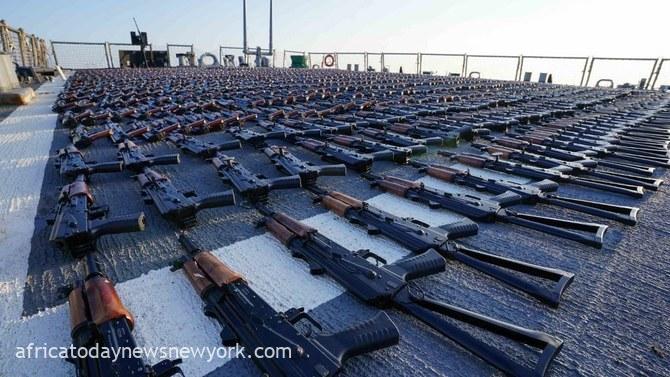The government of the United States has dispatched roughly 1.1 million bullets seized from Iran last year to Ukraine, its military has said.
The rounds were seized from a ship in December, according to the US Central Command (Centcom), which is in charge of overseeing operations in the Middle East.
Recently, Ukraine’s Western partners warned that they were having trouble keeping up with the country’s rapid ammunition consumption.
Centcom says the Iranian rounds were transferred to Ukraine on Monday.
Africa Today News, New York the munitions were originally seized by US naval forces from a stateless ship named MARWAN 1 on 9 December, it said.
The US government gained ownership of them in July through a process known as civil forfeiture, by which an asset can be seized if its owner is thought to be involved in criminal activity.
In this case, the claim was brought against Iran’s Islamic Revolutionary Guard Corps, a branch of the Iranian armed forces tasked with preserving the country’s government.
In a statement, Centcom said the US was ‘committed to working with our allies and partners to counter the flow of Iranian lethal aid in the region by all lawful means’.
Iran backs the Houthi rebels in Yemen’s ongoing civil war, but arms transfers to the group are barred under a 2015 resolution by the UN Security Council.
The civil war in Yemen began in 2014 when the Houthis took control of the capital Sanaa and removed the country’s government.
The ousted government remains the internationally recognised authority Yemen and is backed by a Saudi-led coalition of countries in the region as well as the US and the UK.
Since the second half of last year, Iran has also repeatedly been accused of supplying Russia with arms, most notably drones, for use in the war in Ukraine.
On Monday, in a discussion about the West’s supply of ammunition to Ukraine at the Warsaw Security Forum, Adm Rob Bauer, chair of Nato’s Military Committee, said that the “bottom of the barrel is now visible”.
He said decades of underinvestment meant that, even at the start of the war, Nato countries’ ammunition stocks had been half-full or even emptier.
“The just-in-time, just-enough economy we built together in 30 years in our liberal economies is fine for a lot of things – but not the armed forces when there is a war ongoing,” he said.
He added that governments and arms manufacturers needed to ‘ramp up production in a much higher tempo’.
UK Defence Minister James Heappey urged Nato allies to spend 2% of their national income on defence, a target agreed by the whole bloc but expected to be met this year by only 11 of its 31 members.
The transfer of the Iranian ammunition also comes as the Biden administration looks for alternative ways to provide assistance to Ukraine amid opposition from some in Congress.
Officials have been warning for weeks that the money currently allocated to Ukraine has been nearly exhausted, but pressure from members of the Republican right has so far prevented the House of Representatives from approving additional funds.
On Tuesday, some of the same members won a vote to unseat House Speaker Kevin McCarthy, a move which will delay any vote on further aid until after a replacement is installed, which will not happen until at least the middle of next week.
Even then, any future Speaker who brings a vote on the issue to the floor is almost certain to face similar opposition.

